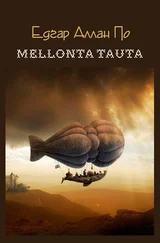Edgar Poe - Mellonta Tauta
Здесь есть возможность читать онлайн «Edgar Poe - Mellonta Tauta» весь текст электронной книги совершенно бесплатно (целиком полную версию без сокращений). В некоторых случаях можно слушать аудио, скачать через торрент в формате fb2 и присутствует краткое содержание. Жанр: Классическая проза, Фантастика и фэнтези, на английском языке. Описание произведения, (предисловие) а так же отзывы посетителей доступны на портале библиотеки ЛибКат.
- Название:Mellonta Tauta
- Автор:
- Жанр:
- Год:неизвестен
- ISBN:нет данных
- Рейтинг книги:3 / 5. Голосов: 1
-
Избранное:Добавить в избранное
- Отзывы:
-
Ваша оценка:
- 60
- 1
- 2
- 3
- 4
- 5
Mellonta Tauta: краткое содержание, описание и аннотация
Предлагаем к чтению аннотацию, описание, краткое содержание или предисловие (зависит от того, что написал сам автор книги «Mellonta Tauta»). Если вы не нашли необходимую информацию о книге — напишите в комментариях, мы постараемся отыскать её.
Mellonta Tauta — читать онлайн бесплатно полную книгу (весь текст) целиком
Ниже представлен текст книги, разбитый по страницам. Система сохранения места последней прочитанной страницы, позволяет с удобством читать онлайн бесплатно книгу «Mellonta Tauta», без необходимости каждый раз заново искать на чём Вы остановились. Поставьте закладку, и сможете в любой момент перейти на страницу, на которой закончили чтение.
Интервал:
Закладка:
Μελλοντα ταυτα
by Edgar Allan Poe
TO THE EDITORS OF THE LADY'S BOOK:
I have the honor of sending you, for your magazine, an article which I hope you will be able to comprehend rather more distinctly than I do myself. It is a translation, by my friend, Martin Van Buren Mavis, (sometimes called the "Toughkeepsie Seer") of an odd-looking MS. which I found, about a year ago, tightly corked up in a jug floating in the Mare Tenebrarum—a sea well described by the Nubian geographer, but seldom visited now-a-days, except for the transcendentalists and divers for crotchets.
Truly yours,
EDGAR A. POE
April, 1, 2848
NOW, my dear friend—now, for your sins, you are to suffer the infliction of a long gossiping letter. I tell you distinctly that I am going to punish you for all your impertinences by being as tedious, as discursive, as incoherent and as unsatisfactory as possible. Besides, here I am, cooped up in a dirty balloon, with some one or two hundred of the canaille, all bound on a pleasure excursion, (what a funny idea some people have of pleasure!) and I have no prospect of touching terra firma for a month at least. Nobody to talk to. Nothing to do. When one has nothing to do, then is the time to correspond with ones friends. You perceive, then, why it is that I write you this letter—it is on account of my ennui and your sins.
Get ready your spectacles and make up your mind to be annoyed. I mean to write at you every day during this odious voyage.
Heigho! when will any Invention visit the human pericranium? Are we forever to be doomed to the thousand inconveniences of the balloon? Will nobody contrive a more expeditious mode of progress? The jog-trot movement, to my thinking, is little less than positive torture. Upon my word we have not made more than a hundred miles the hour since leaving home! The very birds beat us—at least some of them. I assure you that I do not exaggerate at all. Our motion, no doubt, seems slower than it actually is—this on account of our having no objects about us by which to estimate our velocity, and on account of our going with the wind. To be sure, whenever we meet a balloon we have a chance of perceiving our rate, and then, I admit, things do not appear so very bad. Accustomed as I am to this mode of travelling, I cannot get over a kind of giddiness whenever a balloon passes us in a current directly overhead. It always seems to me like an immense bird of prey about to pounce upon us and carry us off in its claws. One went over us this morning about sunrise, and so nearly overhead that its drag-rope actually brushed the network suspending our car, and caused us very serious apprehension. Our captain said that if the material of the bag had been the trumpery varnished "silk" of five hundred or a thousand years ago, we should inevitably have been damaged. This silk, as he explained it to me, was a fabric composed of the entrails of a species of earth-worm. The worm was carefully fed on mulberries—kind of fruit resembling a water-melon—and, when sufficiently fat, was crushed in a mill. The paste thus arising was called papyrus in its primary state, and went through a variety of processes until it finally became "silk." Singular to relate, it was once much admired as an article of female dress! Balloons were also very generally constructed from it. A better kind of material, it appears, was subsequently found in the down surrounding the seed-vessels of a plant vulgarly called euphorbium, and at that time botanically termed milk-weed. This latter kind of silk was designated as silk-buckingham, on account of its superior durability, and was usually prepared for use by being varnished with a solution of gum caoutchouc—a substance which in some respects must have resembled the gutta percha now in common use. This caoutchouc was occasionally called Indian rubber or rubber of twist, and was no doubt one of the numerous fungi. Never tell me again that I am not at heart an antiquarian.
Talking of drag-ropes—our own, it seems, has this moment knocked a man overboard from one of the small magnetic propellers that swarm in ocean below us—a boat of about six thousand tons, and, from all accounts, shamefully crowded. These diminutive barques should be prohibited from carrying more than a definite number of passengers. The man, of course, was not permitted to get on board again, and was soon out of sight, he and his life-preserver. I rejoice, my dear friend, that we live in an age so enlightened that no such a thing as an individual is supposed to exist. It is the mass for which the true Humanity cares. By-the-by, talking of Humanity, do you know that our immortal Wiggins is not so original in his views of the Social Condition and so forth, as his contemporaries are inclined to suppose? Pundit assures me that the same ideas were put nearly in the same way, about a thousand years ago, by an Irish philosopher called Furrier, on account of his keeping a retail shop for cat peltries and other furs. Pundit knows, you know; there can be no mistake about it. How very wonderfully do we see verified every day, the profound observation of the Hindoo Aries Tottle (as quoted by Pundit)—"Thus must we say that, not once or twice, or a few times, but with almost infinite repetitions, the same opinions come round in a circle among men."
April 2.—Spoke to-day the magnetic cutter in charge of the middle section of floating telegraph wires. I learn that when this species of telegraph was first put into operation by Horse, it was considered quite impossible to convey the wires over sea, but now we are at a loss to comprehend where the difficulty lay! So wags the world. Tempora mutantur—excuse me for quoting the Etruscan. What would we do without the Atalantic telegraph? (Pundit says Atlantic was the ancient adjective.) We lay to a few minutes to ask the cutter some questions, and learned, among other glorious news, that civil war is raging in Africa, while the plague is doing its good work beautifully both in Yurope and Ayesher. Is it not truly remarkable that, before the magnificent light shed upon philosophy by Humanity, the world was accustomed to regard War and Pestilence as calamities? Do you know that prayers were actually offered up in the ancient temples to the end that these evils (!) might not be visited upon mankind? Is it not really difficult to comprehend upon what principle of interest our forefathers acted? Were they so blind as not to perceive that the destruction of a myriad of individuals is only so much positive advantage to the mass!
April 3.—It is really a very fine amusement to ascend the rope-ladder leading to the summit of the balloon-bag, and thence survey the surrounding world. From the car below you know the prospect is not so comprehensive—you can see little vertically. But seated here (where I write this) in the luxuriously-cushioned open piazza of the summit, one can see everything that is going on in all directions. Just now there is quite a crowd of balloons in sight, and they present a very animated appearance, while the air is resonant with the hum of so many millions of human voices. I have heard it asserted that when Yellow or (Pundit will have it) Violet, who is supposed to have been the first aeronaut, maintained the practicability of traversing the atmosphere in all directions, by merely ascending or descending until a favorable current was attained, he was scarcely hearkened to at all by his contemporaries, who looked upon him as merely an ingenious sort of madman, because the philosophers (?) of the day declared the thing impossible. Really now it does seem to me quite unaccountable how any thing so obviously feasible could have escaped the sagacity of the ancient savans. But in all ages the great obstacles to advancement in Art have been opposed by the so-called men of science.
Читать дальшеИнтервал:
Закладка:
Похожие книги на «Mellonta Tauta»
Представляем Вашему вниманию похожие книги на «Mellonta Tauta» списком для выбора. Мы отобрали схожую по названию и смыслу литературу в надежде предоставить читателям больше вариантов отыскать новые, интересные, ещё непрочитанные произведения.
Обсуждение, отзывы о книге «Mellonta Tauta» и просто собственные мнения читателей. Оставьте ваши комментарии, напишите, что Вы думаете о произведении, его смысле или главных героях. Укажите что конкретно понравилось, а что нет, и почему Вы так считаете.








